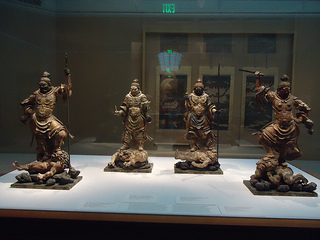Shitenno
From SamuraiWiki
Jump to navigationJump to search- Japanese: 四天王 (shitennou)
The Shitennô, lit. "Four Heaven Kings," are a group of Buddhist figures who serve as symbolic guardians of the four directions. They originated as folk religion figures in Central Asia, before being incorporated into the Chinese Buddhist pantheon, and as such take the form of armored horse-riding warriors. The Four Heaven Kings were particularly revered by the imperial court in the earliest centuries of Japanese Buddhism, as gurdians of the State.[1]
The four are:
- Tamonten 多聞天, also known as Bishamonten 毘沙門天 (Guardian of the North)
- Jikokuten 持国天 (Guardian of the East)
- Zôchôten 増長天 (Guardian of the South)
- Kômokuten 広目天 (Guardian of the West)
The term Shitennô has also been used historically to refer to certain figures' most trusted four generals, or to group and elevate other figures. Some examples include:
- Minamoto Yoshitsune's Shitennô: Suruga Jirô, Kamei Rokurô, Kataoka Hachirô, Ise Saburô
- Oda Nobunaga's Shitennô: Akechi Mitsuhide, Niwa Nagahide, Shibata Katsuie, and Takigawa Kazumasa
- Tokugawa Ieyasu's Shitennô: Honda Tadakatsu, Ii Naomasa, Sakai Tadatsugu, and Sakikabara Yasumasa.
- The Wakaonnagata no Shitennô: Kabuki actors Yoshizawa Ayame I, Ogino Sawanojô, Mizuki Tatsunosuke I, and Sodesaki Karyû
References
- Gallery labels at Freer Gallery of Art, F1976.12,19,20,28.
- ↑ Gallery labels, "Izumo and Yamato," special exhibition, Tokyo National Museum, Feb 2020.
